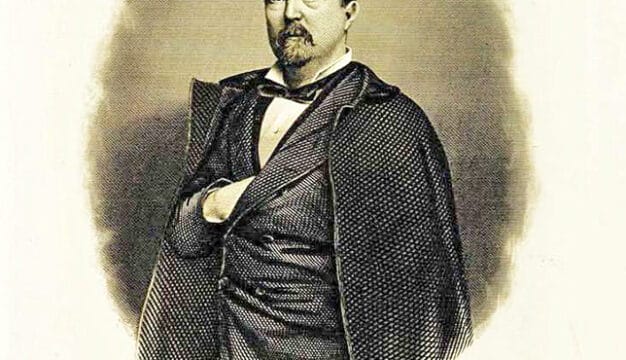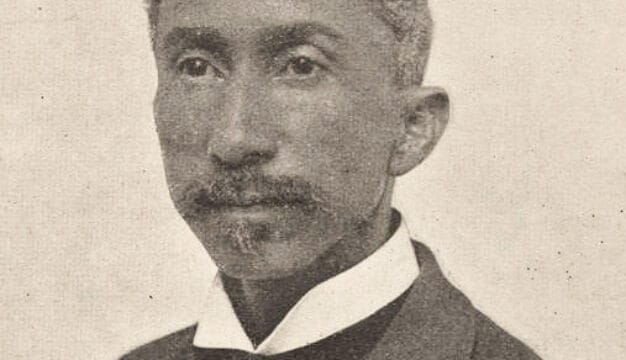Angela Davis
Angela Davis (1944- ) is an educator and civil rights activist who gained notoriety in the turbulence of the late 1960s as a member of the Communist Party and associate of members of the civil rights group the Black Panther Party. She was implicated in a daring prisoner escape that resulted in several deaths but was later exonerated. Davis is a university professor and widely recognized scholar on racial politics.
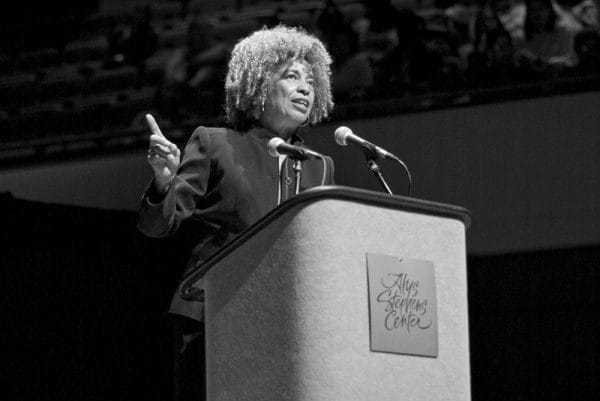 Angela Davis Lecture at UAB
Angela Yvonne Davis was born in Birmingham on January 26, 1944, the oldest of four children of service-station owner B. Frank Davis, who also briefly taught school, and schoolteacher Sally E. Davis. When Davis was four, her family moved out of the all-black projects into a white neighborhood. The following spring, white supremacists opposed to integration bombed the home of their neighbors. Bombings soon became such a constant that this section of Birmingham gained the nickname, “Dynamite Hill.” Davis attended the Carrie A. Tuggle School, which had the battered textbooks and dilapidated buildings typical of many black-only schools in the days of Jim Crow. Eager to leave Birmingham, Davis won a scholarship in 1959 to study at Elizabeth Irwin High School in New York City. She subsequently attended Brandeis University on a scholarship to study French literature and spent her junior year abroad at the University of Paris. While in Paris, Davis learned of the bombing of the Sixteenth Street Baptist Church in Birmingham in which four girls, friends of the Davis family, were killed. The murders left Davis grief-stricken and angry. She graduated magna cum laude in French literature in 1965 and pursued graduate work in philosophy at Johann Wolfgang von Goethe University in Germany under famed Marxist theorist Theodor Adorno.
Angela Davis Lecture at UAB
Angela Yvonne Davis was born in Birmingham on January 26, 1944, the oldest of four children of service-station owner B. Frank Davis, who also briefly taught school, and schoolteacher Sally E. Davis. When Davis was four, her family moved out of the all-black projects into a white neighborhood. The following spring, white supremacists opposed to integration bombed the home of their neighbors. Bombings soon became such a constant that this section of Birmingham gained the nickname, “Dynamite Hill.” Davis attended the Carrie A. Tuggle School, which had the battered textbooks and dilapidated buildings typical of many black-only schools in the days of Jim Crow. Eager to leave Birmingham, Davis won a scholarship in 1959 to study at Elizabeth Irwin High School in New York City. She subsequently attended Brandeis University on a scholarship to study French literature and spent her junior year abroad at the University of Paris. While in Paris, Davis learned of the bombing of the Sixteenth Street Baptist Church in Birmingham in which four girls, friends of the Davis family, were killed. The murders left Davis grief-stricken and angry. She graduated magna cum laude in French literature in 1965 and pursued graduate work in philosophy at Johann Wolfgang von Goethe University in Germany under famed Marxist theorist Theodor Adorno.
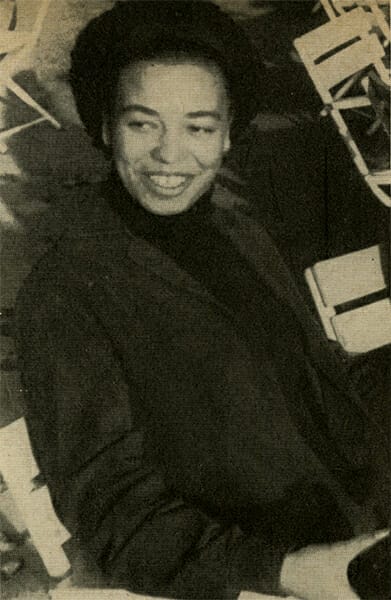 Angela Davis in Germany
Davis returned to the United States in 1967 to study for her doctorate in philosophy under famed Marxist scholar Herbert Marcuse at the University of California, San Diego and join in the civil rights movement. Davis had become interested in mass movements opposing racism, classism, and colonialism while in Europe. In her dissertation, she discussed eighteenth-century philosopher Immanuel Kant’s analysis of violence in the French Revolution. More of an academic than a demonstrator, Davis became a member of the Che-Lumumba Club of the Communist Party in the USA in 1968 and made many friends among the Black Panthers at a time when both organizations were calling for radical change in the United States and were feared by mainstream America.
Angela Davis in Germany
Davis returned to the United States in 1967 to study for her doctorate in philosophy under famed Marxist scholar Herbert Marcuse at the University of California, San Diego and join in the civil rights movement. Davis had become interested in mass movements opposing racism, classism, and colonialism while in Europe. In her dissertation, she discussed eighteenth-century philosopher Immanuel Kant’s analysis of violence in the French Revolution. More of an academic than a demonstrator, Davis became a member of the Che-Lumumba Club of the Communist Party in the USA in 1968 and made many friends among the Black Panthers at a time when both organizations were calling for radical change in the United States and were feared by mainstream America.
After completing her graduate work in 1969, Davis accepted a position as a professor in the philosophy department at the University of California, Los Angeles (UCLA). Although she also had been courted by Princeton University, in New Jersey, and Swarthmore College, in Pennsylvania, Davis chose Los Angeles for its urban location and large black community. Davis then became embroiled in controversy when the campus newspaper, the Daily Bruin, printed an article written by an underground FBI agent stating that she was a Communist. When questioned by school administrators about the affiliation, Davis responded that she believed the question to be impermissible on the grounds of both constitutional freedom and academic policy but also acknowledged being a Communist. A majority of the California Board of Regents, led by then-governor Ronald Reagan, demanded that Davis be fired, and relying on a 30-year-old university regulation forbidding Communists on the faculty, the board complied. The decision, however, ignored recent decisions by both the California and U.S. Supreme Courts, which declared that Communist Party membership did not make an individual ineligible to teach in state universities unless the instructor had the specific intent to promote the overthrow of the U.S. government.
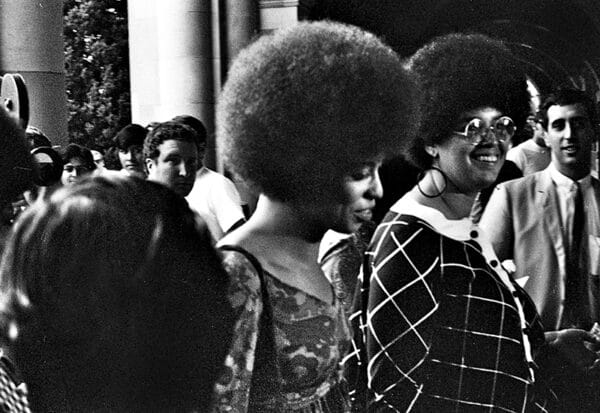 Angela Davis at UCLA
The philosophy department and much of the UCLA faculty stood strongly behind Davis. With approximately 1,000 other professors on campus, the faculty doubted that Davis would be very influential if she chose to promote Communism, and there was no evidence that she intended to promote her political philosophy. Foiled in their efforts to fire Davis, the regents instead monitored her teaching. Students attracted by both the controversy and her teaching skills packed her classes. On a more negative side, the notoriety made Davis the target of daily death threats, forcing her to change her apartment three times and arrange for bodyguards. With her large Afro hairstyle, Davis became symbolic of the politically militant black woman. Developing an interest in prisoners’ rights, she became the Los Angeles chair of the Soledad Brothers Defense Committee, set up to marshal support for three black convicts at Soledad State Prison who were accused of murdering a prison guard. UCLA, subsequently censured for this action by the American Association of University Professors, fired Davis in June 1970 for “unprofessional conduct” for her support of the Soledad Brothers.
Angela Davis at UCLA
The philosophy department and much of the UCLA faculty stood strongly behind Davis. With approximately 1,000 other professors on campus, the faculty doubted that Davis would be very influential if she chose to promote Communism, and there was no evidence that she intended to promote her political philosophy. Foiled in their efforts to fire Davis, the regents instead monitored her teaching. Students attracted by both the controversy and her teaching skills packed her classes. On a more negative side, the notoriety made Davis the target of daily death threats, forcing her to change her apartment three times and arrange for bodyguards. With her large Afro hairstyle, Davis became symbolic of the politically militant black woman. Developing an interest in prisoners’ rights, she became the Los Angeles chair of the Soledad Brothers Defense Committee, set up to marshal support for three black convicts at Soledad State Prison who were accused of murdering a prison guard. UCLA, subsequently censured for this action by the American Association of University Professors, fired Davis in June 1970 for “unprofessional conduct” for her support of the Soledad Brothers.
Davis became embroiled in a new, more serious controversy when several weapons registered in her name were used in an attempted prisoner escape in a San Rafael, California, courtroom on August 7, 1970. Political activist Jonathan Jackson stormed the courtroom armed with a rifle and pistols, handed pistols to three black prisoners at the courthouse, and demanded the release of the Soledad Brothers, including his brother George Jackson, who was romantically involved with Davis. As the armed men attempted to leave with hostages, shots were fired. In the subsequent shootout between the men, police officers, and prison guards, four people, including a judge, were killed and four individuals were injured.
Davis owned two of the pistols that Jackson used. She had legally purchased them in 1968 and 1969 and had purchased the shotgun that was used to kill the judge two days before the courthouse gun battle. The guns had come from a collection of weapons that the Che-Lumumba Club used for target practice and were available to any member. Newspapers and magazines had a field day publicizing her ownership of the weapons. The Marin County attorney general initially held the position that Davis bore no fault in the crimes unless it could be proven that Davis had given the guns to Jackson with the intent that they be used to commit a crime, but he reversed that decision after the storm of publicity. On August 15, 1970, California authorities issued a warrant for Davis’s arrest on the grounds that she had aided in the crime. She faced charges of murder and kidnapping, but other than ownership of the guns, there was no proof that Davis was involved in the attack. She did not issue any comments about the situation, and the police were unable to locate her. Accordingly, a federal warrant was issued, and Davis became only the third woman to date to appear on the FBI’s 10 most wanted list.
Within a few weeks, Davis was captured in New York City, which she believed was a safe place for a black person to be arrested. Denied bail and returned to California, Davis spent 16 months in jail before her acquittal in 1972. A massive “Free Angela Davis” campaign turned her into an internationally known figure.
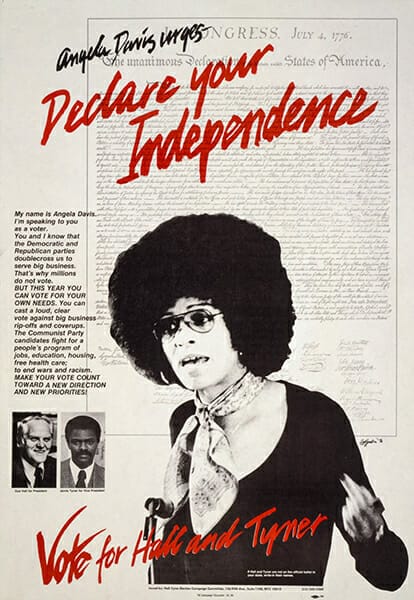 Communist Party USA Poster
After her acquittal, Davis toured the world. Returning to the U.S., she helped found the National Alliance Against Racist and Political Repression in 1973 to help free political prisoners. Beginning in the 1970s, she taught black philosophy and women’s studies in the Ethnic Studies Department at San Francisco State University. A popular lecturer and respected academic, Davis also taught at the San Francisco Art Institute. Continuing her political activism, she ran for vice president of the United States on the Communist Party ticket in 1980 and 1984. She married photographer Hilton Braithwaite in 1980, but the marriage ended in divorce in 1983. In 1991, she was appointed Professor in the History of Consciousness and Feminist Studies Departments at the University of California, Santa Cruz, despite strong objections from political conservatives, and had a concurrent appointment at Rutgers University in New Jersey. She worked mainly with graduate students and was a faculty mentor for the Research Cluster for the Study of Women of Color in Collaboration and Conflict until her retirement in 2008. Davis’s academic interests are feminism, African American studies, critical theory, popular music culture and social consciousness, and the philosophy of punishment, specifically women’s jails and prisons. She has published a number of works on racial politics and has continued her political activism, particularly on behalf of prisoners’ rights. And most recently she has been associated with the Occupy movement opposing economic and social inequality and the Boycott, Divestment, and Sanctions movement for Palestinian rights. She is also deeply involved in the prison abolition movement and is a cofounder of Critical Resistance, an organization devoted to ending the U.S. prison system. In 2017, she was an honorary co-chair of the Women’s March on Washington opposing the election of Donald J. Trump to the presidency. In early 2019, she again stirred controversy when she was slated to receive the Fred Shuttlesworth Human Rights Award from the Birmingham Civil Rights Movement but it was rescinded on January 7 after Birmingham mayor Randall Woodfin and others cited her criticisms of Israel and support for Palestinians. The Institute reversed its decision on January 25.
Communist Party USA Poster
After her acquittal, Davis toured the world. Returning to the U.S., she helped found the National Alliance Against Racist and Political Repression in 1973 to help free political prisoners. Beginning in the 1970s, she taught black philosophy and women’s studies in the Ethnic Studies Department at San Francisco State University. A popular lecturer and respected academic, Davis also taught at the San Francisco Art Institute. Continuing her political activism, she ran for vice president of the United States on the Communist Party ticket in 1980 and 1984. She married photographer Hilton Braithwaite in 1980, but the marriage ended in divorce in 1983. In 1991, she was appointed Professor in the History of Consciousness and Feminist Studies Departments at the University of California, Santa Cruz, despite strong objections from political conservatives, and had a concurrent appointment at Rutgers University in New Jersey. She worked mainly with graduate students and was a faculty mentor for the Research Cluster for the Study of Women of Color in Collaboration and Conflict until her retirement in 2008. Davis’s academic interests are feminism, African American studies, critical theory, popular music culture and social consciousness, and the philosophy of punishment, specifically women’s jails and prisons. She has published a number of works on racial politics and has continued her political activism, particularly on behalf of prisoners’ rights. And most recently she has been associated with the Occupy movement opposing economic and social inequality and the Boycott, Divestment, and Sanctions movement for Palestinian rights. She is also deeply involved in the prison abolition movement and is a cofounder of Critical Resistance, an organization devoted to ending the U.S. prison system. In 2017, she was an honorary co-chair of the Women’s March on Washington opposing the election of Donald J. Trump to the presidency. In early 2019, she again stirred controversy when she was slated to receive the Fred Shuttlesworth Human Rights Award from the Birmingham Civil Rights Movement but it was rescinded on January 7 after Birmingham mayor Randall Woodfin and others cited her criticisms of Israel and support for Palestinians. The Institute reversed its decision on January 25.
Davis came out as a lesbian in 1997 in an interview with Out magazine. She stated that while she accepts discussing her sexuality as a political statement, she wants to keep her relationships private. She was awarded the former Soviet Union’s Lenin Peace Prize in 1979, an honorary doctorate from the California Institute of Integral Studies in 2016, and in 2020 was named one of Time magazine’s Most Influential People.
Works by Angela Davis
If They Come In The Morning: Voices of Resistance (1971)
Angela Davis: An Autobiography (1974)
Women, Race and Class (1981)
Women, Culture, and Politics (1989)
Blues Legacies and Black Feminism: Gertrude “Ma” Rainey, Bessie Smith, and Billie Holiday (1999)
The Angela Y. Davis Reader (1998)
Are Prisons Obsolete? (2003)
Abolition Democracy: Beyond Prisons, Torture, and Empire (2005)
The Meaning of Freedom: And Other Difficult Dialogues (2012)
Freedom Is a Constant Struggle: Ferguson, Palestine, and the Foundations of a Movement (2015)
Herbert Marcuse, Philosopher of Utopia: A Graphic Biography (2019)
Additional Resources
Beegan, Gerry, and Donna Gustafson. Angela Davis: Seize the Time. Munich: Hirmer Publishers, 2020.
Major, Reginald. Justice in the Round: The Trial of Angela Davis. New York: The Third Press, 1973.
Nadelson, Regina. Who Is Angela Davis?: The Biography of a Revolutionary. New York: Peter H. Wyden, 1972.
Olden, Marc. Angela Davis: An Objective Assessment. New York: Lancer Books, 1973.
Parker, J. A. Angela Davis: The Making of a Revolutionary. New Rochelle, N.Y.: Arlington House, 1973.
